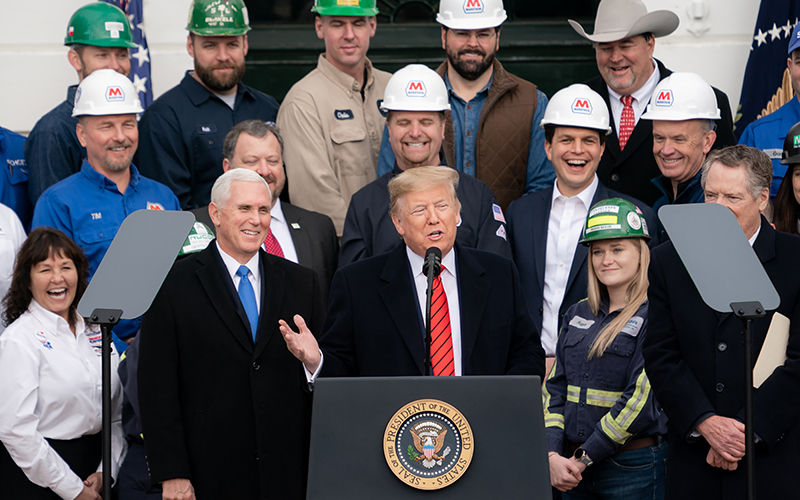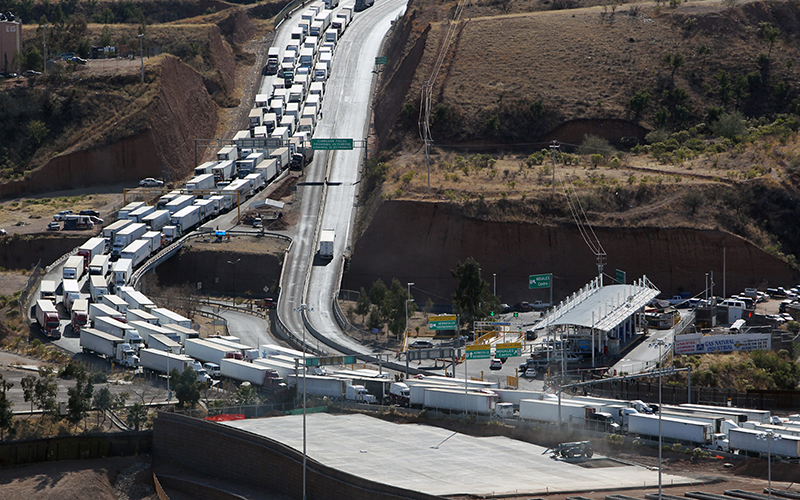WASHINGTON – Arizona businesses and elected officials hailed Wednesday’s signing of the new United States-Mexico-Canada-Agreement that they say preserves markets worth more than $20 billion in trade and 228,000 jobs in the state in 2018.
President Donald Trump, flanked by hard-hatted workers in a White House signing ceremony, hailed the “colossal victory” of the deal, that replaces the 25-year-old North American Free Trade Agreement.
But Democrats also claimed wins in the pact, which they said improves protections for workers and the environment among other things.
The deal has already been approved by Mexico but still needs Canadian sign-off, which could take months more. But supporters were enthused by Wednesday’s signing, which came two weeks after its final passage by the U.S. Senate.
“There is no state that is more competitively placed for trade than Arizona based on proximity,” said Garrick Taylor, a spokesman for the Arizona Chamber of Commerce and Industry. “With this deal, Arizona will continue to grow the number of jobs tied to Canada and Mexico . . . We have been looking forward to this for a year-and-a-half.”
The chamber says more than 228,000 jobs and $20 billion in annual trade rely on our relationship with Mexico and Canada, the state’s No. 1 and No. 2 trading partners.
“Canada and Mexico purchase more than two-fifths of Arizona’s total global manufacturing exports, so the trade deal will enable our small businesses to continue and increase their ability to sell products across the border,” said Greater Phoenix Chamber President & CEO Todd Sanders in a statement Wednesday.
Renegotiating NAFTA had been one of the premier campaign promises by Trump, who derided it on the campaign trail in 2016 as “the worst trade deal ever.” The process to craft a new deal between the three countries began in 2017.
The new deal includes provisions on a range of topics from agricultural produce and homelessness, to manufactured products and digital trade. It also addresses the lack of digital protections to e-commerce and intellectual property in the NAFTA agreement, which predated the internet boom.
More prominent aspects include greater access for U.S. dairy farmers to the Canadian market and greater protections for workers, including migrants and children.
During a 38-minute speech Wednesday at the White House, Trump called the new deal “the largest, fairest, most balanced, and modern trade agreement ever achieved.” But some experts said they see little difference between USMCA and the pact it replaced.
“It took some of the chapters from that (NAFTA) and made that the heart of the new USMCA,” said David Dollar, a senior fellow on foreign policy at the Brookings Institution. “For example, there’s a chapter on cross-border data flow and there’s a stronger chapter on intellectual property rights protection, and on environmental issues and labor issues.”
Dollar said the new deal’s “protections for the U.S. auto industry, which most economists are not in favor of,” could lead to higher prices for U.S. car buyers when factoring in “the value added between Canada and the US, on one hand, and Mexico on the other.”
Inu Manak, a research fellow at the Cato Institute, agreed that there “are some minor changes, but nothing huge” in the final version of the USMCA.
“There’s a lot of similarities, when you look at overall text of the agreement, a lot of it was copied and pasted over from the original NAFTA,” she said.
Manak said in a blog post, however, that the new deal does include better provisions for settling disputes between countries, attempts to increase transparency on the regulatory process in each country and a higher limit – $800 – on good that can move duty-free between countries.
Arizona lawmakers applauded the deal that Rep. Greg Stanton, D-Phoenix, said business “have been eagerly awaiting.” He said the deal will “preserve and open up new opportunities with our two largest trading partners.”
Arizona exported $7.7 billion in goods to Mexico and $2.2 billion to Canada in 2018, according to data from the U.S. Trade Representative, while importing $9 billion and $1.5 billion, respectively. By comparison, the state shipped $1.2 billion in goods to China in 2018.
Rep. Tom O’Halleran, D-Sedona, called the new pact “an example of legislating done right – thoughtful negotiations, consideration of input from stakeholders and experts, and bipartisan, bicameral support.”
All of Arizona’s congressional lawmakers voted for the plan, which passed the House on 385-41 vote in December and passed the Senate 89-10 on Jan. 16.
Sanders noted that the new deal will help the 80% of Arizona businesses that are small businesses.
“With the new custom and trade rules reducing red tape, small businesses will be able to engage in cross-border trade more easily,” his statement said.


